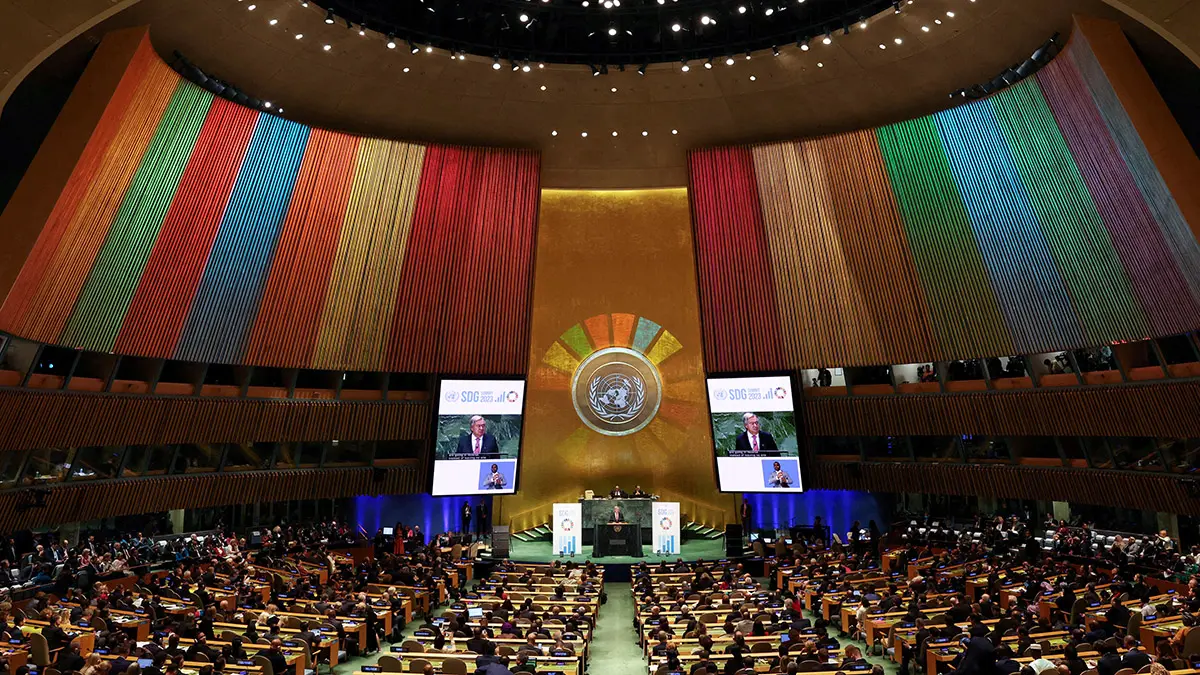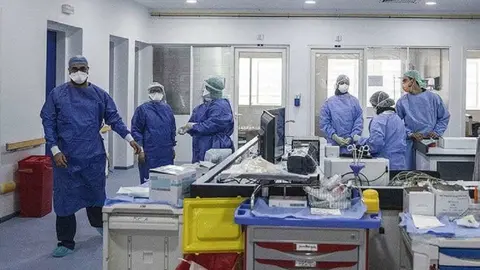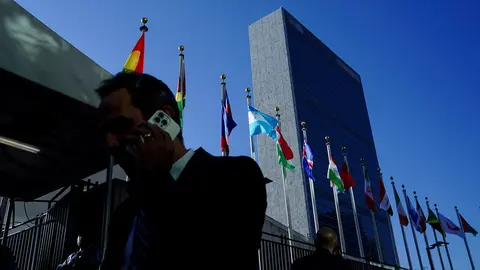UN: "The world is caught between war and climate change"

It has been the same annual meeting every year in New York, as it has been since 1946, to discuss the great vicissitudes and challenges of the moment among the world's leaders. The words that have been heard most frequently since then have had to do with war and peace; in the last five years, climate change and, since 2020, the coronavirus pandemic have also been the recurring themes.
War, peace and the devastating effects of climate change were once again the focus of attention for the 149 leaders gathered in the emblematic buildings of the United Nations (UN) during the 78th General Assembly on 18, 19 and 20 September.
However, there were notable absences of several dignitaries whose countries are permanent members of the UN Security Council, such as France, the United Kingdom, China and Russia.
The absence of Chinese President Xi Jinping, who has not attended the General Assembly for two meetings in a row, was noticeable; in fact, a few days ago he did not attend the G20 summit in India. According to the US media, the White House interprets Jinping as trying to avoid a meeting with his US counterpart, Joe Biden.
Also absent was French dignitary Emmanuel Macron, who has become the host of a state visit by Britain's King Charles III and his wife, Queen Camilla.
The British Prime Minister, Rishi Sunak, cited scheduling problems while the Russian dictator has an international arrest warrant issued by the International Criminal Court (since last March) that keeps him cornered in Russia and only with the possibility of travelling to allied countries that are not within the ICC.
Nor was Mexico's president, Andrés Manuel López Obrador, or India's Prime Minister Narendra Modi, embroiled in a series of diplomatic frictions with both China and Canada, with the former again over border disputes in the Himalayas and with the latter over the murder of Sikh leader Hardeep Singh Nijjar in western Canada.
Justin Trudeau, Canada's Prime Minister, went so far as to declare that the police had found indications that it could be a political assassination engineered from India, but committed on Canadian territory, which for him is a clear violation of his country's sovereignty.
In the midst of this scenario of disagreements, the attention and discourse was dominated both by US President Biden and the presence of Volodymir Zelenski, President of Ukraine, as a speaker at the General Assembly.
In his opening speech, UN Secretary General António Guterres made the achievement of the Sustainable Development Goals (SDGs), with a deadline of 2030, one of the major priorities that have not received the right attention since the outbreak of the coronavirus pandemic, then the Russian invasion of Ukraine and the constant climate catastrophes that are becoming more acute every year.
Guterres recalled that world leaders adopted the SDGs in 2015, pledging to leave no one behind: "The goals include ending extreme poverty and hunger, ensuring access to safe drinking water and sanitation and green energy, and providing universal quality education and lifelong learning opportunities".
This year, the UN has used the discussion theme to headline its meeting under the slogan "Rebuilding trust and rekindling global solidarity: Accelerating action on the 2030 Agenda and its Sustainable Development Goals towards peace, prosperity, progress and sustainability for all".
The UN intends to ensure that this is not just another failure. Dennis Francis, the president of the UN General Assembly, pointed in the same direction, asking those present not to falter because 8% of the world's population still suffers from hunger.
"With concerted and ambitious action, it is still possible that, by 2030, we can lift an additional 124 million people out of poverty and ensure that 113 million fewer people are undernourished," he said.
If interest in the SDGs is not awakened, Guterres warned that it will not be possible to achieve the goals set, which overall mean reaching 169 targets, of which, he said, only 15 per cent have been met to date.
The head of the United Nations also called for a change in the business model of multilateral development banks so that they can offer financing at lower and even preferential rates for the most backward countries.
He stressed that the war is an unacceptable invasion of a sovereign country, with serious consequences that are affecting countries that are highly dependent on grain and cereal imports. "This war is bringing more hunger to the world".
He also called for all countries that are signatories to the Charter of Human Rights to commit to ensuring gender equality and an end to discrimination and gender-based violence.
Renewing multilateralism
If there is one thing that Guterres and President Biden seem to have agreed on, it is that in their respective speeches at the UN lectern they both pointed to the need to renew the foundations of multilateralism in order to adapt it to a changing world.
Before Biden spoke before the highest UN tribune, it was the turn of Brazil's President Luiz Inácio Lula da Silva, who once again recycled the same discourse he has been defending since he returned to power in Brazil and has been able to participate in all the different major regional and multilateral international meetings.
He said this at the Mercosur meeting, then at the BRICS in South Africa, at the G20 in India, and he did so in New York at the UN to endorse that the global south has suffered an excessive exclusion from the major social, equitable and global wealth-sharing policies; and he once again aligned himself with the group of countries that are not willing to take a stand against Russia to condemn it for the invasion ordered by its ruler, the dictator Vladimir Putin.
"The UN has to change. It has to be said, the Security Council has been steadily losing its credibility precisely because a few countries wield so much power," he said.
Biden took up the gauntlet thrown down by the Carioca dignitary and took to the lectern to give a measured and coherent speech with that concordance and lucidity that sometimes fails him and which is so often criticised by Republicans as a sign of mental infirmity due to age.
The Democrat's speech was mainly charged against China and Russia, and he once again made defence and support for Ukraine his favourite leitmotif.
While Brazil wants the Security Council to be reformed to accept new members and change the rules on vetoes and even be included as a new member (along with several other countries), Biden acknowledged in his speech that all the international institutions created at the end of World War II from the UN, the World Bank, the World Trade Organisation and others remain "an enduring foundation of our progress", although he recognised the need to reorient them to a changing world.
Nor is he unhappy about a possible expansion of the UN Security Council with new member states and changing the rules of the veto. Currently, China, France, Russia, the United Kingdom and the United States are the five permanent members with veto power, in addition to ten non-permanent members who are elected by the General Assembly for two years on a rotating basis, this time it was the turn of Albania, Brazil, Ecuador, Gabon, Ghana, Japan, Malta, Mozambique, Switzerland, the United Arab Emirates and the United States.
In addition to making his position on Brazilian leader Lula da Silva's request clear, President Biden spent a good part of his speech insisting that the dignitaries present at the UN should join the sanctions, isolate Russia and demand that it withdraw its invading army from Ukrainian soil.
"If we allow Ukraine to be dismembered, is the independence of nations guaranteed? The answer is no. All of us together within the United Nations must stand against this deliberate aggression that Ukraine is suffering at the hands of Russia," Biden reiterated again and again to a waiting audience.
The US president warned those present that there is a need to unite around this proclamation because there is a great need to have a common stance in order to deter others and thus prevent future aggression.
"Russia believes that the world will tire and allow it to brutalise Ukraine without consequence. But I ask you this: if we abandon the basic principles of the UN, can any member state feel confident that it is protected?," Biden remarked.
In the US, which is already in the midst of a pre-election campaign for the 2024 presidential elections, Biden attended several fundraising events prior to the UN meeting, where he reiterated that Ukrainian troops will continue to receive US weapons, with M1 Abrams tanks about to be sent to them, and there will be more resources for Zelenski's government; in fact, he is proposing another package of $13.1 billion in additional military aid and $8.5 billion for humanitarian support.
However, resources may not be as readily available as promised to Ukraine: a group of Republican lawmakers have been demanding that Biden cut back and restrict aid while Donald Trump himself continues to declare that as soon as he becomes president again there will be no more aid for Zelenski.
Exit of the invader
Precisely on Tuesday 19 September, Zelenski himself came in person to New York to speak to the audience of world leaders. As Putin was absent, Russian Foreign Minister Sergey Lavrov was there instead, but he decided to leave the plenary during the Ukrainian leader's 20-minute speech.
The Russian ambassador to the UN, Vasily Nebenzya, remained in the room and listened unmoved to the Ukrainian leader's condemnations and reproaches.
"The aggressor is arming many other things and these things are used not only against our country, but also against all of you, fellow leaders. Everyone in one way or another feels the repercussions and we know that it is impossible to stop this war because all efforts face the veto of the aggressor or those who support the aggressor," Zelenski argued, looking at Nebenzya.
The Ukrainian dignitary condemned the invasion, demanded a ceasefire, the return of Russian abducted children who are outside their country without knowing where they are staying on Russian soil and demanded that Russia pay for its war crimes.
He also proposed: "It is time to temporarily expel a member that violates the founding charter of the UN; second, take every resolution vetoed in the Council to the Assembly and empower the Assembly to lift the veto".
The invasion of Ukraine is now a year and a half old, has left more than 6 million Ukrainian refugees and, according to the Pentagon, at least five hundred Ukrainian soldiers are estimated to be wounded or killed daily and by the Russian side an estimated 300-350 wounded or killed daily. The opacity in reporting the number of casualties, both on the Ukrainian and Russian sides, has led the Pentagon to mathematical estimates.
What will happen to the reform that several countries are proposing for the UN? Its immediate future depends precisely because it requires the approval of two-thirds of the members of the General Assembly, although the veto of two of the five permanent members would be enough to stop its reform in order to modernise both the seats on the Security Council and the use of vetoes.



